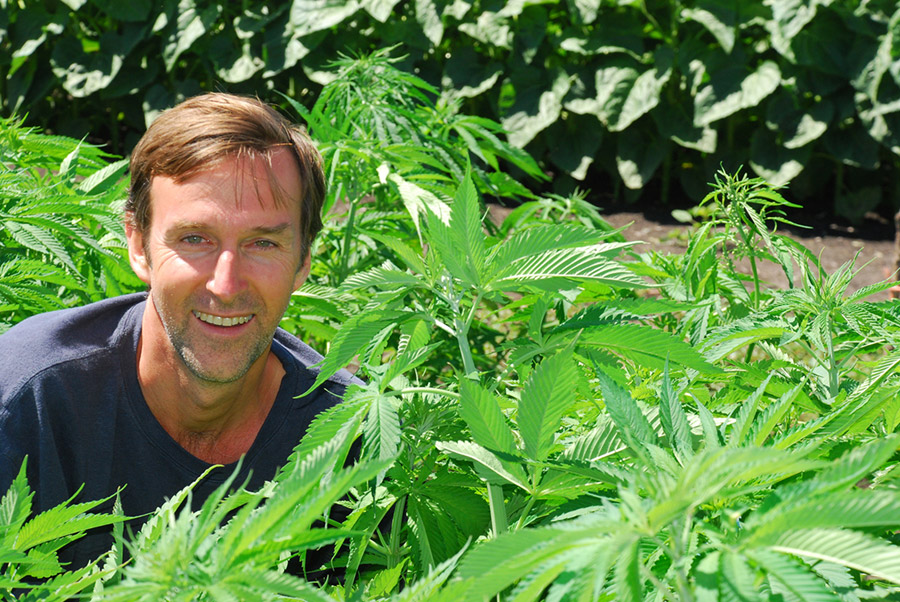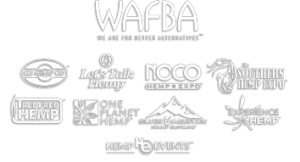Will We Regenerate with Hemp, or Choose Corn 2.0?
By John Roulac
America’s hemp movement has come a long way in the past 25 years. Today, hemp CBD is experiencing its own day in the sun moment. Everywhere you turn, there’s a news story—from CVS rolling out hemp to 800 stores to Martha Stewart getting into CBD-infused pet products. In the coming decade, sales of hemp CBD are expected to rival those of vitamins.
Yet there’s a growing concern among conscious consumers about the fact that the hemp plant is a major bioaccumulator that concentrates pesticides and other contaminates. Shall we choose hemp CBD flowers grown in RoundUp-soaked non-organic soils, or select those grown on organically farmed land? Shall we support organic farmers or farmers that spray Monsanto chemicals ?
Corn 2.0
Many of the current leaders in CBD, and new entrants including Canopy Growth and the recent Manitoba Harvest purchaser, Tilray, hail from the pot industry.
The pot barons bring with them a cowboy culture born from years of operating in the shadows of the black markets. The pot industry is infamous for its environmental destruction, copious use of chemicals, and lack of transparency. In a rush for corporate profits, the pot mavens seem to want to steer the hemp industry into a remade version that we could call Corn 2.0. We are not only talking chemicals but GMO breeding to create “THC-Free” hemp varieties, un-labeled of course ; )
Hemp, like corn, draws nitrogen out of the soil as it grows. The vast majority of hemp grown in the USA for fiber or flowers utilizes great amounts of synthetic nitrogen fertilizer, causing major eco damage to local streams, lakes, and oceans. Indoor pot growers use the same type of harsh nitrogen fertilizer made from fracked natural gas.
Unfortunately, the U.S. Hemp Authority(a trade group formed to create standards and to certify products), is not requiring brands to label the fact that they’re using GMOs or even list whether a brand’s hemp is from Europe or China. Many longtime hemp allies are not happy with this rushed , ‘pay to play’ standard, created by the pot barons themselves with help from the industrial ag sector. (See this letter that I co-signed: https://cannabusiness.law/open-letter-regarding-the-us-hemp-authority-certification-program/.)
Beyond soil health itself, fertilizers are a main contributor to climate change, and runoff following storms is the leading cause of ocean dead zones in the Gulf of Mexico. We all need to heed the following wake-up call: At our current rate of excess carbon and heat, every fish, dolphin, and whale in our seas is projected to vanish by 2040 because of plankton die-off.
Regeneration with Hemp
A major difference in how certified-organic hemp is grown is the use of renewable cover crops like clover or alfalfa to provide the nitrogen. Want to get the Cliff’s Notes on how agriculture, the leading cause of global climate change, can also be the leading solution through better practices such as composting, cover crops, and biodiversity? Ready for a paradigm shift? Watch the two-minute trailer for Kiss the Ground (https://vimeo.com/242796310), a major motion picture (co-produced by this writer).
The booming hemp industry can pivot to more eco-friendly and climate-beneficial farming practices. It can focus on soil health versus the vague corporate doublespeak of “responsible farming” and “sustainable methods.” Hundreds of hemp brands have claimed that their hemp is organic, yet have failed to deliver proof of organic certification for their growing methods or even their brand.
The Choice Is Ours
With ocean die-off and the increasing intensity of climate change bearing down on us, it’s crucial for us to choose to regenerate with hemp. Cleaner farming practices make cleaner botanicals. Doesn’t the choice seem rather easy?
As consumers and retailers favor brands that are working to regenerate with hemp, organic farmers will increase their acres—while the acreage of non-organic, eco-destructive “Corn 2.0” hemp farmers will inevitably shrink.
Look for the USDA organic symbol on hemp products from CBD to hemp seed oil. RE Botanicals is excited to be on this leading edge—along with new fresh hemp juice brand Lumen; organic hemp CBD brand Nature’s Love; Nutiva the largest organic hempseed brand, Mad Agriculture, a Colorado NGO working to help farmers be more regenerative; the venerable Rodale Institute; Mark Lewis, a Colorado soil farmer growing hemp in 2019; and soils health guru Ray Archuleta, who was a key note speaker at the world’s biggest hemp exposition and conference, NoCo Hemp Expo 2019.
It’s time to regenerate with hemp!
John Roulac is the founder of RE: Botanicals, offering USDA Certified Organic full spectrum hemp extract products. He also is the founder of the superfoods company Nutiva, and five ecological nonprofit groups, including GMO Inside. He’s written four books, including Backyard Composting and Hemp Horizons. Visit www.johnroulac.com, Facebook.com/John.Roulac.




